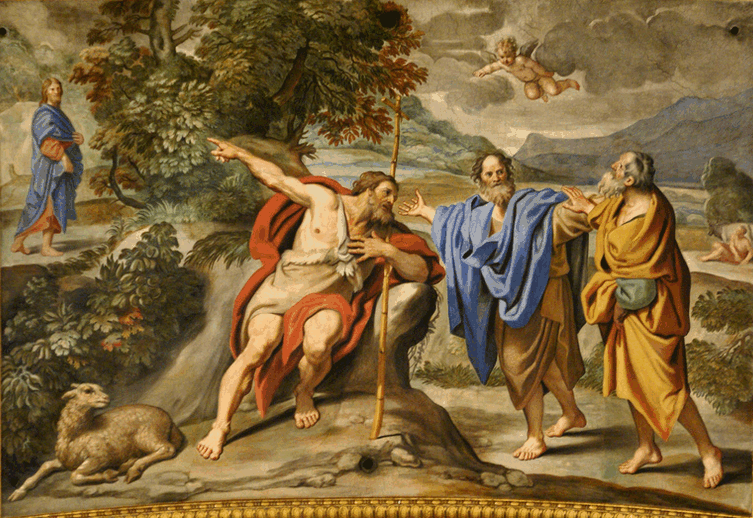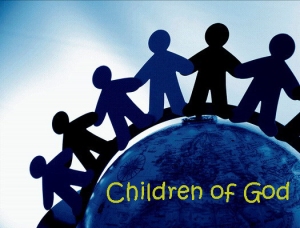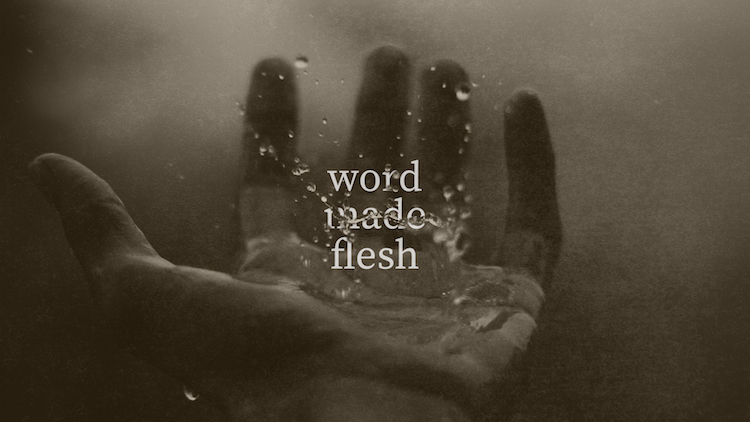Below is the Bible Study written by Jim Rudiger for his Sunday School Class which meets at Third Presbyterian Church, Norfolk, Virginia. It's based on John 1:1-14.
The power goes out. An hour later it comes back on. What is the first thing you need to do? Get the right time on all of your electronic clocks. How many clocks or time devices, electronic or wind up, do you have just in your kitchen? Now, take your time counting them. I have four. I went through my whole house and I have a total of 13 clocks and that doesn’t include wrist watches which add four more to the list. That’s a lot of time to have on my hands.All of our lives, parents and teaches have told us that we have to make every second count. Ever had anybody tell you that? Count for what? No matter how hard we try, we can’t make time stop. Even if we work really hard at it, we can’t “save time.” We don’t have a bank account where we can deposit “saved” time for a rainy day. It’s here one minute and gone the next. What we call “saving time” is really using it for something else. If I eat my supper faster and “save” the time I would usually take, it will be so I can snuggle down on the sofa in the den under my afghan and wait for FiFi, my dog, to come in and wake me up to watch a Lassie movie on TCM.
Clocks help us use our time during a day. When it comes to using our time in the future, we turn to calendars. Do you have a calendar on your refrigerator where you write down coming appointments or when the Tides are at home? Jackie would have been lost without her refrigerator calendar. We spent a lot of time putting dates on future calendars. Why? Because we wanted to know how and where we are going to spend our time. Eventually that future time comes and what does it become? The present. And as quickly as the future becomes the present, the present becomes the past and we are penciling in new future dates on our calendars.
OK. That’s enough time spent on time. How does that figure in on our study today? John tells us that Jesus was very involved with time. He came in existence at a particular time. He was born at a particular time. His ministry covered a particular time. His death and resurrection came at a particular time. The important point John makes about Jesus is that, unlike us, time doesn’t place limits on him. Jesus is the eternal being who spent a little time being human. Some of us live like there is no tomorrow and some live dreading tomorrow. John tells us that there was a person - Jesus - whose tomorrows go on till the end of time. It all boils down to this. It’s time to start our study right now.
The four gospels approach Jesus in slightly different ways. The first gospel, Mark, is interested in the ministry of Jesus, so, that’s how he starts is account. Mark doesn’t tell us anything about the birth of Christ. Mark is interested at getting to the ministry of Christ. Then came Matthew. Matthew was interested in tying Jesus to the whole history of Israel. Even before he tells us of the birth of Jesus, he gives a long line of ancestors reaching all the way back to Abraham. Not long after Matthew’s gospel, Luke wrote his book. Luke’s purpose was to show that Jesus was more than an Israelite. Jesus was involved with all mankind. So, Luke traces Jesus’ roots all the back to the first man, Adam.
The final gospel was written by John while he was in exile on the Greek island Patmos. His gospel is the favorite of theologians because it demands that you put on your thinking caps. The other three gospels are easily understood accounts of Jesus’ time here on earth. So why was the gospel of John written? The other gospels had been in circulation for nearly thirty years when John was written. Scripture tells us that John accepted the other Gospels. He tells us that he wrote this book to fill in what had happened in the first year of Jesus’ ministry which wasn’t covered enough in the other three. In John there isn’t an account of the birth of Jesus; a detailed description of Jesus’ baptism; the Last Supper; Gethsemane or the Ascension. There are no parables or stories Jesus told. But, included in John and not the other gospels is the miracle of turning water into wine, the Samaritan woman, the healing of the blind man and the raising of Lazarus. The other gospels leads us to believe that Jesus’ ministry lasted for a year. It is in John’s gospel that we find out that it lasted three years. So, push your hair back and pull down your thinking cap, 'cause here comes the Gospel of John.
John 1:1 In the beginning was the Word, and the Word was with God, and the Word was God, 2 He was in the beginning with God.
When does John start his story? In the beginning. Is there a better place to start anything than the beginning? What does John mean to convey by saying “in the beginning”? The beginning of everything. Before all time. Before the creation of the universe. That time before the first day was crossed out on a calendar. That time before the first click of earth’s clock moved the minute hand. The starting line. A race can’t start or be run if there is no starting line. I take my GPS and input the location of where I want to go. What’s the first thing that pops up? The GPS locates my car in front of my house and then plans a route from there to where I want to go. You see, it starts with where we are now.
What was at the beginning? The Word and it sounds like the Word is sure getting around. We understand what John is talking about Jesus, but why did John pick “word” to describe Jesus? Why not just say Jesus? It would sure make the text a little easier to follow wouldn’t it? John was going to save that identification until the right time. In the mean time, John chose to use the Greek word Logos, which we translated as “Word.” For Greeks, Logos means more than something used in verbal communication. Logos means reason, study, ideas and wisdom. It is the root word for geology, theology and genealogy - the study of earth, God and kin folk. If something makes sense then it’s logical. Same root word.
If I ask you what 2+2 equals, what would you say? Four. Why? You can easily prove it if you take two apples and add two more, you can count the apples you have and you know there are four apples there. We don’t need a calculator, a computer or a MIT graduate to answer that question. All we have to do is look at the pile of apples, apply a little reasoning and we can find the answer. This is what the Greeks meant by “Logos.” You study the apples, use a little reasoning and you arrive at the answer that there are four apples in the basket.
So, John is comfortable with the Greeks knowing what he’s getting at when he uses Logos. How is he going to use a Greek word, Logos, as a bridge to Jewish theology? Here’s how he did it. In Proverbs 8 which deals with wisdom has wisdom saying: “Ages ago I was set up, at the first, before the beginning of the earth. When there were no depths, I was brought forth.” The verses go on to say that wisdom was there all the way through creation. Wisdom was always with God like a skilled mechanic. In other words wisdom was there before creation and was instrumental in the shaping of creation. Now, one of the Greek definitions for “Logos” was Wisdom. John took the concept of wisdom described in Proverbs and just substituted “Logos” as “The Word” for wisdom. Let’s read Proverbs again substituting “The Word” for wisdom. “Ages ago The Word was set up, at the first, before the beginning of the earth. When there were no depths, The Word was brought forth.” Sound familiar.
John tells us three things about the Word. What are they? With God. Was God. In the beginning was with God. From this view of the Word, is the Word separate from God? Or do God and the Word come in one package? You couldn’t separate them if you tried. John is making it clear that while we can talk about God and we can talk about the Word, we can’t separate God from the Word. It’s like I can talk about the radio in my car and I can talk about the air conditioning in my car, but, both are part of the same thing - my car.
John1:3 All things came into being through him, and without him, not one thing came into being. What has come into being 4a in him was life,
John is still talking about the Word, so, he brings up another important aspect of the Word. In Geneses how did God create things? He spoke. God said let there be light and there was light and it didn’t cost $50.00 a light bulb. When you speak what do you use? Words. We use words to communicate, but, God uses words to create. And those words have power and action associated with them. That is why John says that while the Word is with God, God through this Word created everything. Why stress that all things were made through him? For John, this was very important because in his time there were people saying that God created some things but not everything. Some claimed that God made souls but didn’t make the bodies housing the souls. To those people souls were good and bodies were evil. John says, “Not true. God made bodies as well as souls because God made everything.”
John1: 4b and the life was the light of all people. 5 The light shines in the darkness, and the darkness does not overcome it.
What are the two things that The Word had in him? Life and light. Later on in this gospel, John tells us that the reason Jesus came was so we could have life and have it abundantly. What are the benefits of light? Safety. You can see where you’re going. Truth. Light shows things for what they are. I know you can remember dates who looked pretty good on a dimly lit front porch but stopped clocks when the light hit them. But, light is also a symbol for wisdom and knowledge. In the funny papers, when a character finally get a good idea, how is it pictured? As a light bulb going on in his head. John is now tying light to the Word - tying light to wisdom - to Logos.
What does the light do? Shines into the darkness AND darkness didn’t overcome it. Remember that before the first act of creation, there was darkness and void. The darkness that existed before creation was more than an unlit room. It carried with it the idea that there was chaos and disorder. God spoke The Word and it overcame that darkness. Light not only lit the place up, it got rid of chaos and brought order to the world. That was one of the chief values of the light. If the chaos and disorder weren’t dealt with, creation would have been stopped in it’s tracks.
John 1:6 There was a man sent from God, whose name was John. He came as a witness to testify to the light, so that all might believe through him. He himself was not the light, but he came to testify to the light. 9 The true light, which enlightens everyone, was coming into the world.
The story shifts. John is no longer talking about the beginning before creation, but, has shot way ahead on his refrigerator calendar to his own time, and John introduces another character whose name is who? John. Which John? Not the author, but John the Baptizer. For some reason the writer of this gospel never refers to John the Baptist only to just John. The writer is now talking about a specific time in history. John the Baptizer was a historical figure who people saw and either knew personally or knew about.What did he do? Witness and testify. The writer is stressing what fact about this John? He is not the light. The true light was coming after him. The writer had just talked about the light and it’s importance. He says that he knew the Light. He was a friend of the light. Believe me, John the Baptizer was not the light. Does this strike you as being a little bit hard on John the Baptist? After all the Baptist never claimed to be the Light. In fact he said he wasn’t good enough to tie the laces on Jesus’ sandals which was a job fit only for lowest ranking servant. Why does John stress this business about John the Baptizer's lower place in things?
Here is what was happening. There were some people who had been baptized by John and never had heard of Jesus. These people assumed that John was the long promised Messiah. The writer isn’t putting John down. He is setting the record straight for those who out of ignorance or bull headiness don’t understand that John the Baptizer came to pave the way for the Messiah. John was a prophet, but, he definitely wasn’t the promised Messiah.
John 1:10 He was in the world, and the world came into being through him; yet the world did not know him. 11 He came to what was his own, and his own people did not accept him.
Who was in the world? The Word. John confronts one of the great tragedies of mankind. The person through whom all things were made - even humans - was ignored by the very creatures he made. It’s like the story of Steve Jobs who created Apple Computers. The company he founded was stolen away from him. Later, when they made a mess of the company, they got him back to straighten things out. That’s what happened with the Word. His creation stole the world from him. Then when things go south, the world finds the Word and hopes he’ll straighten things back out. The worst part about this is who didn’t accept him? His own people. And who would that be? Israel. Israel knew the Word as Wisdom, yet, didn’t follow what they knew Proverbs had instructed them concerning Wisdom.
John 1:12 But to all who receive him, who believed in his name, he gave power to become children of God, 13 who were born , not of blood or of the will of the flesh or of the will of man, but of God.
John just painted the negative side of Jesus’ life. Now, he covers the positive side. Did all ignore the Word? No. What did those who believed in his name get? The power to become children of God. Hey, I thought the song says that we are all God’s children. If we are, what’s all this about becoming children of God? They are all God’s creatures and he loves even the worst of His creation. That’s the kind of being he is. But, there is difference between being a child and becoming a child. It’s like a man who has two sons. To the first son, Dad gives him a car at his high school graduation. A fine red convertible. Sends him to UVA with plenty of pocket money. The son is never expected to get a job during the summer. He can just lay around playing computer games. He graduates from UVA and Dad gets him a good paying job in his company. Dad has sacrificed to give his son all the advantages in the world. His love for the son has let him indulge the son. In return, the son never utters a “thank you.” Never thinks about how Dad is doing. He takes all that he has been given and shuts the door between he and his Dad and walks away from the relationship. Never appreciating what Dad has done for him. To this son, he was entitled to all the things Dad had given him, so, no thanks were needed.There is another son. On those hot summer days when dad was out there cutting the grass, this son talks Dad into going inside and resting while he finishes the cutting. When this son graduated from high school, he knew Dad was strapped for cash sending his other brother to UVA, so, he tells Dad he doesn’t need a car. He’ll get rides with his buddies. When college came along, he went to TCC so he could be close to Dad in case he was needed. He gets a job to help with tuition. He graduates and gets a job, but, calls everyday to see how Dad is doing. They talk about politics, sports - anything that Dad wants. Two sons. The first son grew further and further from Dad. While the second son grew closer. Both are sons, but, the sonship is different. Each one is Dad’s child, but, the second son has become Dad’s child in a way the first never will. He has become what Dad wanted him to be, a loving caring child. John says that the Word gives us the power to become that second son.
There is a human side to all of this. What God offers we have to accept. A human father may offer his son love, advice and friendship and the son may refuse it and go his own selfish way. The same is true with God. He offers us the right to become his children, but, we have to accept. And how do we accept? By believing in his name. What does it mean - “believing in his name”? Jews placed a lot of importance on a name. When we think of a name, what does it mean to us? For Jews the name was a lot more. The name described an attribute about the person. It revealed the nature of a person. You changed your name when an attribute became prominent. Saul became Paul. A guy from being called “Curley” to now being called “Baldy.”
What attribute would the Word’s name describe? Trust. You can take it to the bank. Faithful. Loving. Eternal. To put their trust in the name of the Word is to put their trust in who the Word is - part of the God they have never seen. But, since the Word and God exists as one being, if they see the Word, they see God. They can become a son of God because we have seen God in the Word.
John 1:14 And the Word became flesh and lived among us, and we have seen his glory, the glory as of a father's only son, full of grace and truth.
So far John has talked about how the Word was part of everything that has happened. He has given the Jewish concept of Wisdom a new identity called “The Word.” Now that he has everybody’s attention, he’s going to drop the bomb. They have seen and understood everything that The Word is and it’s time for them to move to the next level. John is going to let them know something special that happened to the Word. What does he tell them? The Word has become flesh. This Word which created the world; this Word which brought order out of chaos has become a person and we have seen him with our own eyes. He has lived in the same world as we have. When John says that we have seen his glory, he isn’t talking about imagining what his glory would look like. The word he uses means to see something physically right now with our own eyes. He tells them if they want to see what the Word looks like, all they have to do is look at Jesus.Up to this point the Greeks would have no problem with what John has said concerning the Word - Logos. But to now say that this God had come to earth and became a human being was beyond the pale for them. To the Greek, the body was an evil prison where the soul was held captive. They couldn’t imagine God willing to live in anything as horrible as a body that was subject to decay.
Some Greeks were turned off by this idea. What they did was to develop a scenario where they could accept Jesus but deny the human side of his existence. There arose in the church a group known as Docetists which comes from the Greek word meaning “seems to be.” What they believed was that Jesus was only a phantom. He only seemed to be human. What appeared to be his body, really wasn’t a human body at all. He was like a ghost who didn’t get hungry or feel pain. You can see that crucifixion would pose a big problem for these guys.
A few weeks ago we went to Daylight Saving Time. That meant that seventeen clocks had to fall back and the worse thing we have to do is to set the time. In a few months we will be reversing what we just did. Why, you ask? Because time is fleeting. As time goes by, I’m remembering that time is of the essence. There is a time and place for all things. We can’t get away from it folks. We are either looking for more time or wasting the time we have. Time out. It's time to end our time together. So I'll leave you with one question. What time do you have?
Let us pray: Father, give us the time in our hectic lives to accept your invitation and give us the power to become your child. Amen.







No comments:
Post a Comment